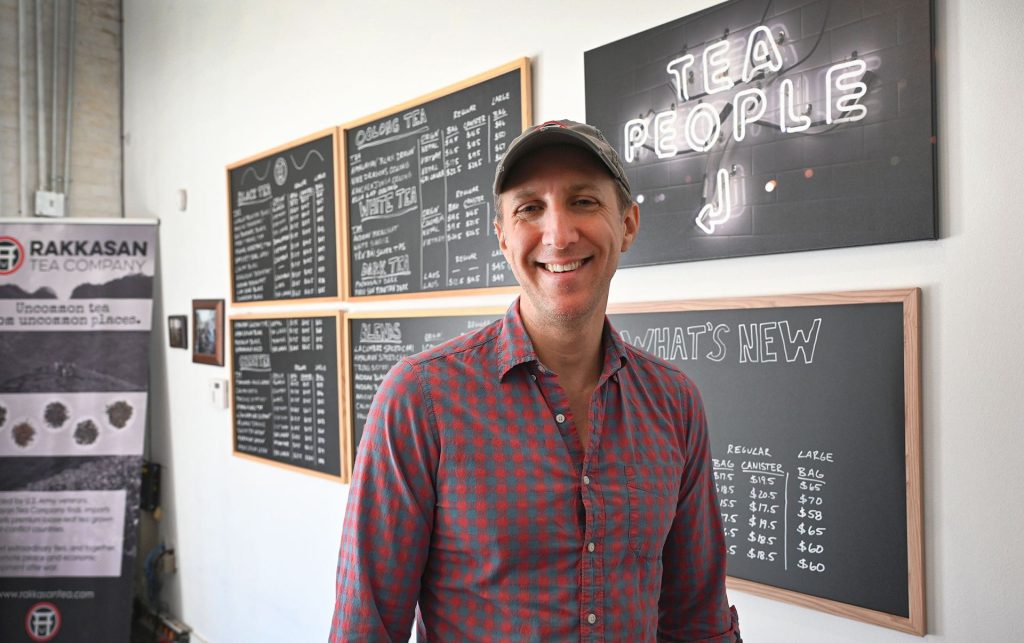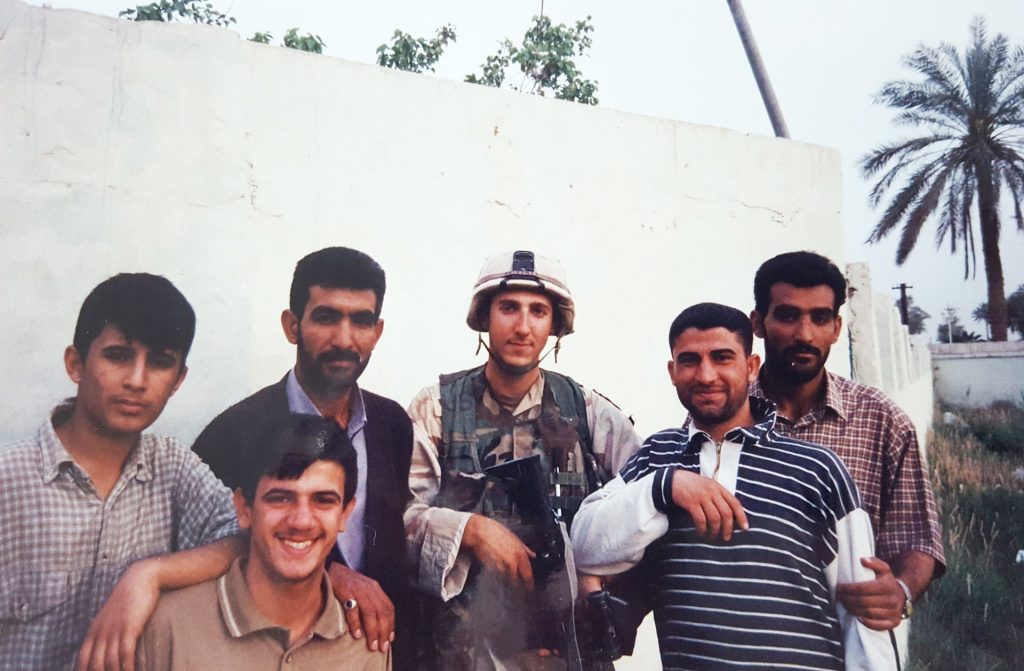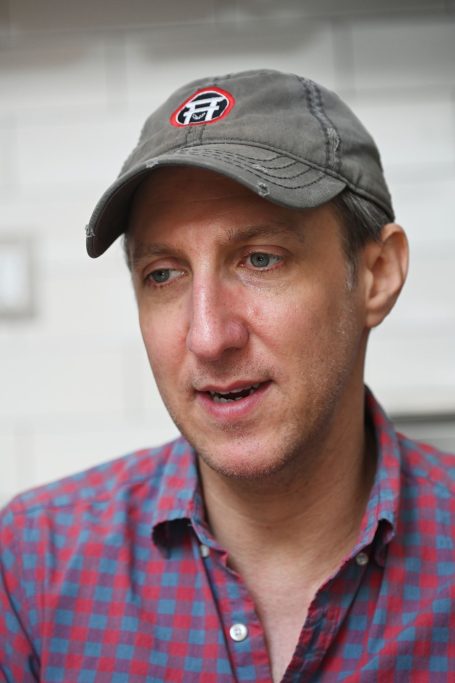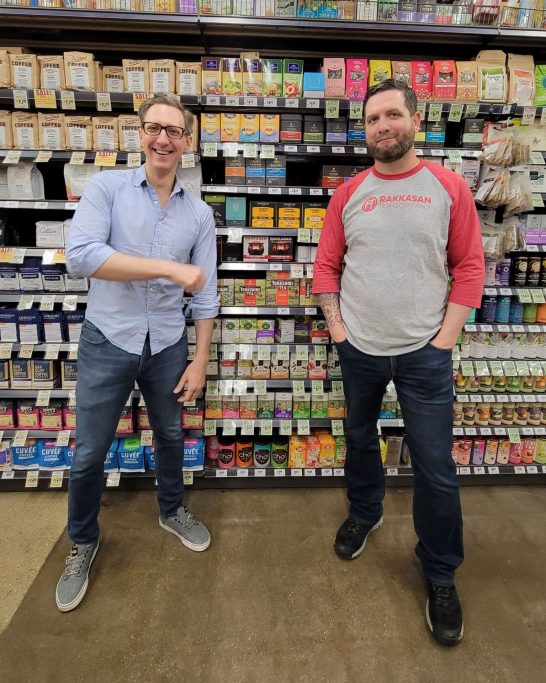Comet Corner: A Veteran on a Mission to Help International Farmers
By: Jeff Joiner | July 12, 2023

Brandon Friedman MPA’06 is the co-founder of Rakkasan Tea Co. in Dallas, a venture that combines his military experience with his desire to help farmers in war-torn regions of the world.
Friedman imports high-grade teas from post-conflict countries with the aim of helping their economies. Launched in 2017, Rakkasan Tea Co. has grown from a small online distributor of top-quality loose-leaf teas to now feature a storefront in Dallas selling more than 50 varieties of bagged and loose-leaf teas from eight countries, along with tea brewing accessories and gifts.
Friedman’s idea for a starting a tea company came from his experience as a U.S. Army officer in the 101st Airborne Division who fought in both Afghanistan and Iraq where drinking tea was a way for the U.S. military to connect with locals. Recognizing the high cost of war in many countries that also produce tea, Friedman and fellow veteran and business partner, Terrence Kamauf, made it their business mission to help tea producers in war-torn countries connect with new markets in the U.S.
Now found in the tea and coffee aisle of Dallas-area Central Market grocery stores, Rakkasan Tea Co. continues to expand its offerings and educate American consumers about drinking quality teas imported from throughout the world while benefiting small producers.
Describe your experience as an Army officer meeting with locals in Afghanistan and Iraq over tea.
That’s where I was first exposed to the culture of drinking hot teas. I don’t think I had ever drank hot tea before. Whenever we stopped to have tea with locals, it was always a kind of oasis amid the chaos of combat and violence. The tea was always a calming event where you could sit down and just be a human being with Iraqis or Afghanis and drink tea. So, it was a good experience. It had a positive connotation for me.

What did you do following your military service?
When I got out of the Army I moved to Dallas where I had a lot of family and friends and it was close to my parents in Shreveport, Louisiana, where I grew up. I went to The University of Texas at Dallas and got my Master of Public Affairs. A couple of years after graduation I moved to Washington, D.C., where I went to work for the Department of Veterans Affairs. Then I worked for a couple years in D.C. in corporate public relations before joining the Obama Administration as the deputy assistant secretary for public affairs in the Department of Housing and Urban Development. I left HUD in 2015 to start a PR firm in D.C. Then I moved back to Dallas to start Rakkasan Tea Co.
Why start a company selling imported tea?
I drank a lot of tea when I was overseas, and it was always a good experience. The tea was really good, very sweet, and when I came home, I kind of wanted to recreate that vibe and I realized that it didn’t really exist here. I wanted to buy real, authentic tea and when I went to the grocery store all they had were teas like Celestial Seasonings with a little bear on it. But I wondered, where is that tea culture? Here in Dallas, I ended up going to halal stores (where food permissible to the Muslim faith is sold) to buy bags of authentic, loose-leaf tea. I continued to drink tea and it became like a hobby. So then, with my first partner, who also enjoyed drinking tea, we decided to start the business.
What do you mean by ‘peace through tea’?

I had a kind of light-bulb moment in researching the tea industry when I realized that almost all the tea in the U.S. is low-grade tea that comes from huge producers in China, Japan, India and Taiwan. I also learned that there were a lot of either current war zones or post-conflict countries that were recovering from war that were also tea producing countries that you can never get their tea here. There’s just no supply chain between rural farmers in Laos and a Tom Thumb grocery store here in Dallas. But I realized that there’s a lot of artisanal, really good tea being produced in Laos, Myanmar, Vietnam, Rwanda, Colombia, Sri Lanka and other places that are post-conflict countries, and I thought this business could help those countries with economic development. Later, one of my Army buddies became my business partner, and this idea of helping these small farmers became a natural fit for us because we had seen the cost of war and how war impacts communities.
How did you make connections with tea producers?
Our first tea supplier we got through connections with a with guy who started a nonprofit in D.C. that helps veteran-owned businesses conduct international business. He knew a guy at the State Department who knew someone at USAID (U.S. Agency for International Development) who knew a British expat who had started a small organic tea farm in Sri Lanka. He was very helpful, and we still sell his tea today. Then I found another British expat living in Ho Chi Minh City, in Vietnam, who sells tea there, but he gets tea from the farmers in far north Vietnam. He travels up there and buys wild tea, which they can’t spray with pesticides, which is a problem in Vietnam. These are wild, 400-year-old tea trees. Over the years we’ve cultivated connections with farmers and suppliers in all these countries. A German woman in Laos. A Scottish tea consultant who helped us get tea from Sri Lanka and many others.
What does Rakkasan mean?
Rakkasan is the nickname of the 187th Infantry Regiment of the 101st Airborne Division. That was our unit in Afghanistan and Iraq. The word is Japanese and was used by the Japanese just after World War II when they referred to U.S. parachute soldiers like the 101st Airborne. The word means parachute in Japanese, but it actually translates as “falling down umbrella.”
What is the future of Rakkasan Tea Co.?

The U.S. tea market is the only tea market in the world that’s expanding right now. We have a friend who introduced us to a broker/distributor for Central Market, and once he heard our story, he decided Central Market had to have it. That was big for us. We’re working now to get into more stores with our bagged teas. The storefront here, which we opened in 2021, is also a part of our future, although most of our business is online. We’re also working on ready-to-drink cold brew teas that we can sell in stores. Those are really popular in 7-Eleven and other convenience stores.
What is your personal favorite tea?
So, I try not to play favorites too much, but if I was stuck on a deserted island with no way off, and I could only take one tea with me, it would probably be a Ceylon black tea. It’s just the feeling, the aroma, the flavor. It’s just a good, solid black tea. But in the summer, I crave green tea because it’s lighter. When it’s like 110 outside in Dallas, I want something not as heavy.
Visit Rakkasan Tea Co. online or visit their store at 1619 N. Hall St. in Dallas to learn more.